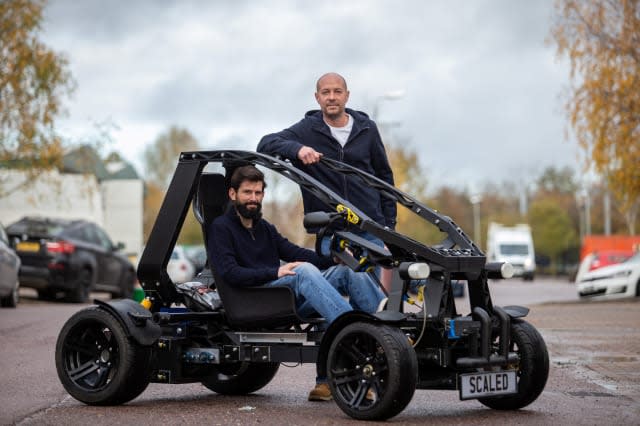British boffins unveil Europe's first working electric Mario Kart-style buggy made from recycled plastic and built on a 3D printer

Story and video from SWNS
British boffins have unveiled Europe's first electric-powered Mario Kart-style buggy made from recycled plastic and built on a 3D printer.
The Chameleon, which weighs 150kg (23 stone), has a top speed of 45mph and could revolutionise commuter travel and cut pollution.
The battery-powered buggy produces no emissions and is around a third of the size of an average car.
It was built using a chassis made from a super-strength recycled plastic and built on a 3D printer.
Swindon-based engineering company Scaled built the vehicle in just three months over lockdown.
They believe their vehicle - which cost £10,000 to make - would be ideal to take commuters and shoppers on short journeys in towns and cities.
Managing director David Speight said: "We use large 3D printers in order to print on plastic to create the chassis on a vehicle.
"It is the first vehicle we have done, this Chameleon. The name was chosen because it is adaptable.
"The system we use to make the chassis is more adaptable than a traditional car plant where on a line you can only produce one car.
"We are saying if you require a different design we can make different types and styles.
The reason we can do that is because it is adaptable.
"With 3D printing on plastic you can make a design very quickly. That is why the material is used for prototypes.
"Most people up to now didn't think plastic is strong enough but we have tried to prove you can do it in this way.
"The fact we have done a vehicle that is printed onto plastic shows there is enough strength there."
The Chameleon is currently going through rigorous testing and has so far managed 30-minutes before needing to be recharged.
Mr Speight added: "We plug in the battery to a charger, take it off and put it back into the vehicle.
"It has taken three months after we started during the lockdown period this year.
"We worked flat-out with a couple of people in our team. To go from nowhere to having a vehicle with so few people in a few months takes some doing.
"We don't have any plans to drive long distances. Instead we are waiting for people to see that we can make small batches of vehicles just how they want them.
"We are working on a pod vehicle that would take people from a railway station to work on a short journey.
"For people with Covid concerns we could design a vehicle that has better protection for passengers.
"I have this idea that we are trying to help the environment by saving emissions.
"It makes no sense to take a small commuter journey in a two-tonne metal vehicle like a Tesla.
"You're using all that steel and gubbins and the only cargo is you and your briefcase.
"If and when we make it road-legal, the Chameleon is not going to get much bigger.
"Plastic is just much faster to work with and it helps in the manufacturing process."
The company is now pitching for investors to help bring the Chameleon to market.
Mr Speight said: "The pod project is going through a process where they are looking for someone to pay for it.
"The right person would be someone who gets it and is prepared to wait and pay for development so that within six months to a year we could get something on the road."



